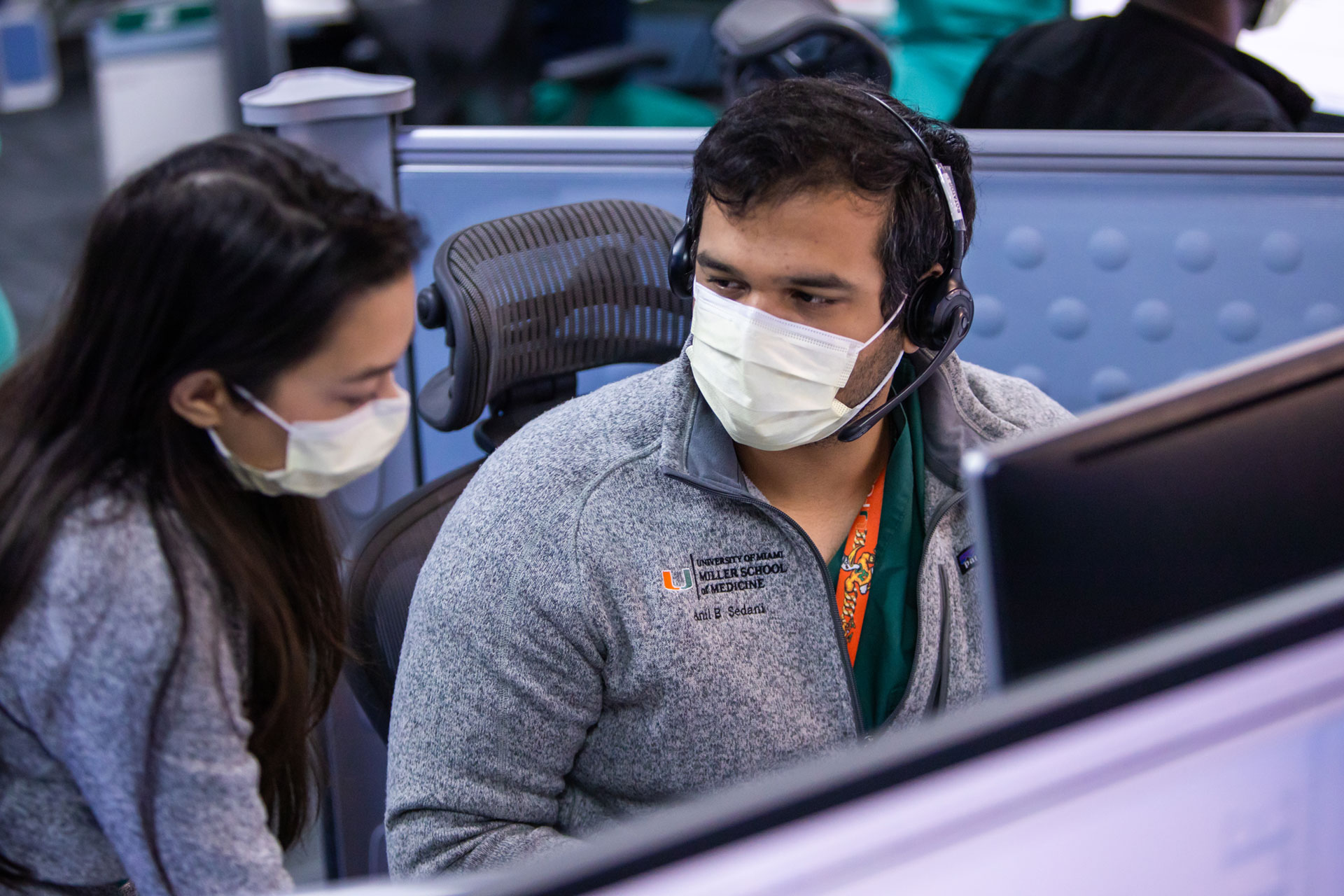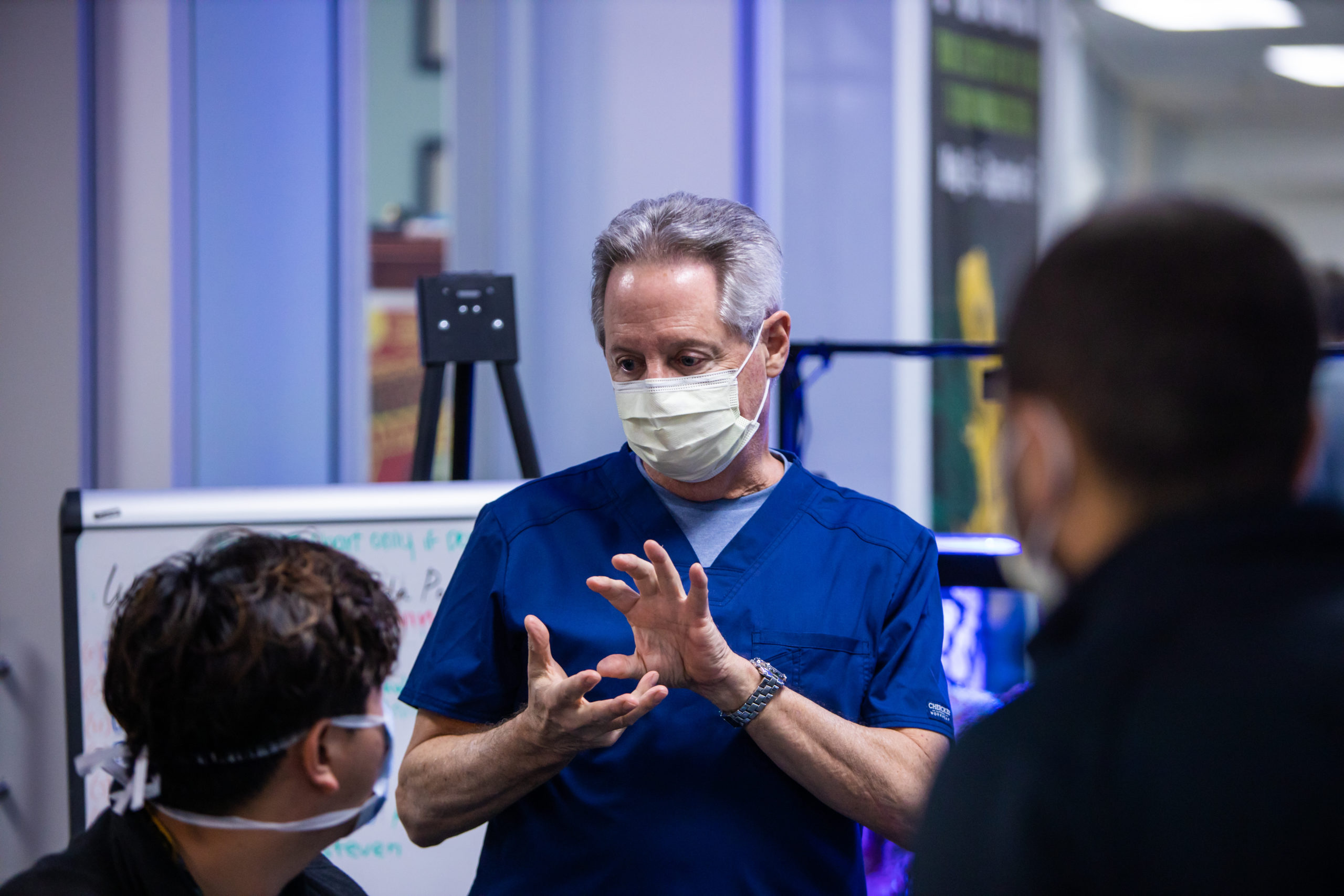Medical Students Answer the Call
When the coronavirus reached Florida, Miller School student volunteers jumped into action
By Robert S. Benchley
Photographs & Video by David Sutta Photography
Photographs & Video by David Sutta Photography

On Wednesday, March 11, when there were still only 20 diagnosed cases of COVID-19 in Florida (three more would be added that day), the Department of Health contacted Richard Weisman, Pharm.D., at the Miller School of Medicine to ask if the Florida Poison Control Network could take over the operation of the Department’s COVID-19 hotline. Overnight, the call volume had gone from 500 to 2,000 calls per day, swamping the Department’s existing capabilities to handle questions from the public.
Dr. Weisman, who oversees the UM/JMH Poison Control Center, a cooperative venture with Jackson Memorial Hospital, reached out to the state’s other two poison centers, located in Tampa and Jacksonville. The centers have a long history of operating the State’s emergency hotlines for H1N1, Zika, and the Deepwater Horizon oil spill, so they had the structure in place to respond to major events. The plan was to move calls to the poison centers within 48 hours, and on Friday, March 13, it went live.
“On that first day, we answered 2,800 calls,” Dr. Weisman said. “It was all hands on deck for our staff and rotating residents and medical students, and we could see that we would need more help and quickly. Working closely with the leadership at the Miller School and Jackson, we formulated a strategy to staff the center.”
Immediate Response
Dr. Weisman, who is also associate dean for admissions, knew the first place to turn — The Mitchell Wolfson Sr. Department of Community Service (Wolfson DOCS), a medical student volunteer group. He contacted members of the Wolfson DOCS Emergency Response Team, and the response was immediate.
“I was working at the Poison Control Center when the whole thing started. We recruit the volunteers and supervise them, so I knew how the systems worked,” said Cayla Suthumphong, a third-year student.
“Dr. Weisman sent an email to Wolfson DOCS members, and within 24 hours, 40 students had shown up for training,” said second-year student Tara Tardino, community outreach coordinator on the Wolfson DOCS Executive Board. “That eventually grew to 175 — like a full medical school class. We developed call scripts for them. I was so impressed at how things happened so quickly.”
Jackson Memorial Hospital committed the full support of their HR Department to immediately hire new staffing for the COVID Hotline.
“Within one week, we had 12 new health professionals, fully credentialed, oriented and ready to assist,” Dr. Weisman said. “It was an unprecedented accomplishment.”

Richard Weisman, Pharm.D., with student volunteers
Growing Call Volume
“To date, the COVID-19 Hotline has answered more than 38,000 calls from both the public and health care professionals,” Dr. Weisman said. “Accurate information, early disease recognition, social distancing and good decision making will help to reduce the devastating impact of COVID-19 on our South Florida community. Our medical students have done an extraordinary job to go well beyond the questions they are asked. Recognizing the emotional challenges our callers face, they skillfully work long hours to help our state and our community to adapt to a world that is very different from our normal way of life.”
The questions asked by callers have changed, too.
“They asked basic questions at first: What is coronavirus? What are the symptoms? Can I die?” Tardino said. “Now the questions are more complex, and we don’t always have the answers. We have to say, ‘I don’t know. No one does,” when that’s the truth.”
“Some of the callers are health care professionals,” said Suthumphong. “Some have tested positive and want to know who to report to, what to tell their patients and coworkers. It’s very humbling and a big responsibility for all of us on this end.”
For any questions related to COVID-19 in Florida, please contact the Department’s dedicated COVID-19 hotline at 1-866-779-6121. The hotline is available 24 hours per day. Inquiries may also be emailed to COVID-19@flhealth.gov.
Pandemic Philanthropy
Other students at the Miller School, and indeed across the country, responded to the challenge by setting up charitable organizations to provide PPE, meals, groceries — even child care — to health care workers on the front lines.
“In mid-March, when we saw what was beginning to happen in South Florida, we formed Miami Med COVID Help,” said Alison Ohringer, M.P.H., M.S., president of the first-year Miller School class and one of the organization’s founders. “We have an executive board of 25 students, 150 student volunteers and 50 volunteers from the community.”
Social media has been used to connect similar efforts at other medical schools with one another. Through this contact, they share what they are doing, what has worked and what challenges they have encountered.
PPE Comes First
“We realized quickly that PPE would be the main thrust,” said Ohringer, “so we began to focus on that. A student at NYU developed a program that can identify all local businesses that might have PPE to donate, so we used that here and began calling them. When people learned that we were medical students, they asked a lot of health questions, but they also began to understand the importance of what we are doing and were more willing to donate. Some businesses we called were unsure about donating if they only had a small quantity. We tell them that we will take anything. One mask can save one life.”
Nonetheless, those small donations have added up to impressive totals. To date, Ohringer reports, the organization has received or 3D printed, and then distributed, 25,000 face shields, 10,000 surgical masks, 10,000 nitrile gloves and 5,000 N95 masks. They have also given out 1,000 care packages and delivered 1,000 meals to emergency departments.
The group has set up a gofundme account to raise cash and also registered as a 501(c)3 non-profit organization.
“This helps us with companies that need a formal receipt for their donation,” Ohringer said, “and especially with companies that match employees’ donations.”

Alison Ohringer delivering donated PPE. Photograph by Jennifer Jackson, M.D.
Photograph by Jennifer Jackson, M.D
Building Morale
Miami Med COVID Help also distributes care packages and cards and letters of encouragement to health care workers. Ohringer says it helps build morale among those on the pandemic’s front lines who are working long, difficult shifts.
Some companies have donated 3D printing capabilities, and Ohringer and several committee members are helping produce face shields, intubation boxes, masks and other critical front-line supplies. Nasal swabs for increased testing is the next capability being developed.
“I can’t tell you how proud I am of what we have done and how hard the students have worked — and we’re still in school,” she said. “Or how many calls I get every day from people wanting to donate or help in any way possible. It’s hard to reflect on what we have achieved when we’re still in the middle of chaos.”


